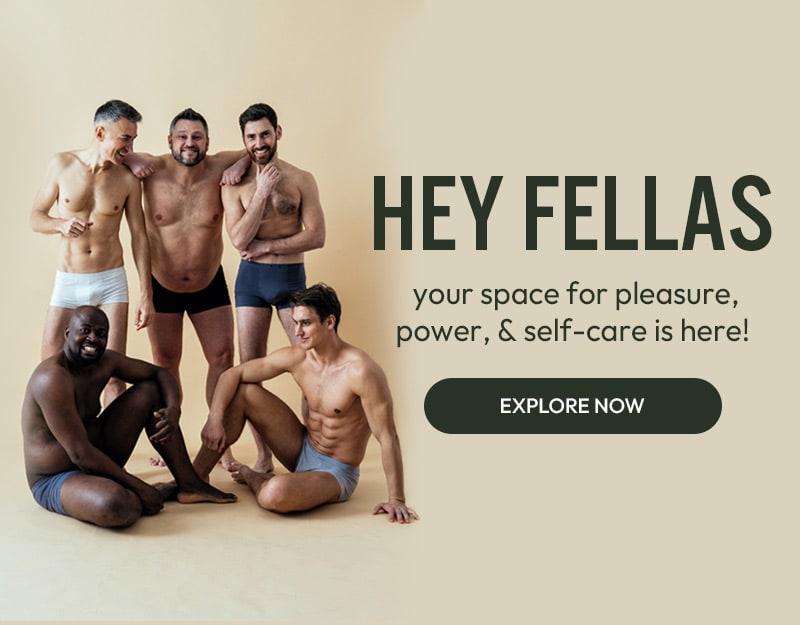What Sex-Positivity Is — And Is Not
-by Carol QueenI have been using the term "sex-positive" for over 25 years–I first heard it when I moved to San Francisco in the 1980s to get my PhD at the Institute for Advanced Study of Human Sexuality. It immediately became part of my vocabulary; I had been doing LGBTQ activist work since the mid-1970s, which included taking about homophobia, and the way "sex-positive" illuminates and helps to address a broader erotophobia was immediately clear to me when I heard the term. I could never have believed back then how widespread this phrase would become. (Shout-outs to United Feminists at Georgetown and their Sex-Positive Week, currently being celebrated there!) But I have begun to feel lately that it has come to be misunderstood in some circles. This is the kind of sex-positivity I learned about–and when I use the term, this is what I mean.
Sex-positivity is:
- a way to acknowledge that human sexuality is diverse and broad. There is no one definition of "normal."
- non-judgmental, or in any case it asks us to be aware of (and be in control of) own our judgements.
- a foe of shaming others about sexual (and gendered) matters, including children.
- a way to acknowledge that we should have certain sexual rights, including the right to comprehensive, appropriate, pleasure-inclusive, positive sex education.
- a construct that invites us to acknowledge that pretty much any fully consensual behavior might be right for someone, and pretty much nothing is right for everyone.
- an idea that can't be fully expressed outside of an atmosphere/context of consent. Informed, non-coercive consent. CONSENT.
- a term that can include anyone, including virgins, asexuals, people who have been abused, people who have never had pleasurable or even good sex–because it does not describe the sex they do/don't have, it describes their attitude about sexual diversity and people's sexual rights. (And of course it may be a tool to open the door to much more positive sex–but only if it's what they want.)
- more than anything, a way to critique our current culture–which clearly is not sex-positive. I express the critique like this: What would it take for our culture to be fully sex-positive? What are the elements that would get us there? (I invite you to think about that question–it is a valuable lens in a personal context and in activist work.)
- a notion that gives us access to true respect for other people's sexualities.
Sex-positivity is NOT:
- a phrase that means "I love sex!" (Though if you do–that's great! Yay, you!)
- a phrase that means "I'm kinky or experimental; I'm not vanilla." (Vanilla people can be just as sex-positive as kinksters, and in fact, not all kinksters are sex-positive!)
- a phrase that can EVER be used this way: "If you were really sex-positive, you'd have sex with me/do that kinky thing I want to try/open our relationship/etc."
- to be used as a source of judgement or shaming of other people–including heterosexuals, asexuals, non-kinky folk, celibate people, or anybody else.
- a way to judge others for not enjoying sex enough.
- a new norm about what people should do in their sex lives.
- a license to assume that your sexual response, experience, desires, and feelings are or should be shared by everybody else.
I can't stress this enough. If anyone, no matter how sexually frisky and happy they are, tries to use the notion of sex-positivity to judge someone else's sexual orientation, gender expression, sexual choices, or sexual response, they are not behaving in a sex-positive fashion. Period. (And they're misusing the term.) When you are sex-positive, you get that you are not like everybody else, and that's all good. As in:
- I'm attracted to people who are like this, and others may be attracted to people who are like that.
- I have orgasms this way, and other people have orgasms that way.
- I like this sex toy and other people might not (and vice versa).
- I like this kind of sex, so other people get to like their kind of sex.
- I want a certain kind of relationship, and others get to want the kind of relationship that works best for them.
- I respond this way to this sexual thing, but other people might respond a different way.
- I grew up with beliefs, experiences, in a particular cultural context that affects my sexual feelings now; other people grew up within other cultural contexts.
By the way, Good Vibrations has its own take on this issue; here's an excerpt from the Sex-Positivity section of the GV website at goodvibes.com:
At Good Vibrations, we believe that sexual pleasure is everyone's birthright. We believe that sexual pleasure is an important part of all of our lives, and that everyone should be able to live the sex life that's right for them. We take it as our mission to respond to all forms of sexual shame and support people as they discover their authentic sexual selves. We believe that any adult consensual sexual activity is something to affirm and celebrate. We do not judge anyone's sexual preferences or choices, so long as those choices and activities are between adults and consented to by everyone involved or affected. Ongoing education is essential to our mission. In order to be the best possible resource for our customers, we constantly strive to have a better understanding of sexual variation and to advance our own knowledge of sexual pleasure and desire. To provide an environment that is supportive of our customer's needs, we understand that our Sex Educator-Sales Associates must maintain an open and respectful attitude and to model sex-positive, non-judgmental communication at all times.
So go forth and be as sex-positive as you wish! And please debunk other peoples' misuse of this term. Too many sex people are not sex-positive enough. It is an extraordinary tool of analysis and activism, and we need to wield it cleanly–not mucked up with the idea that only the chosen few are sex-positive based on their behavior or orientation.








